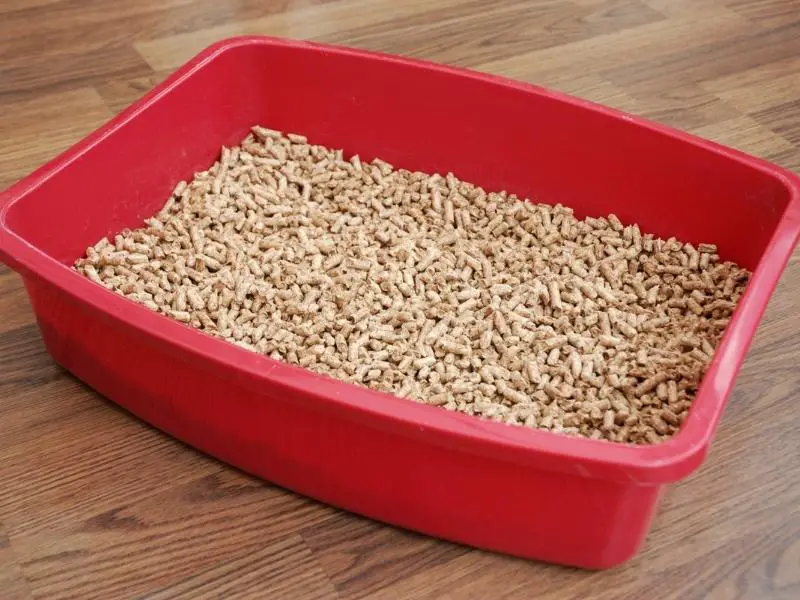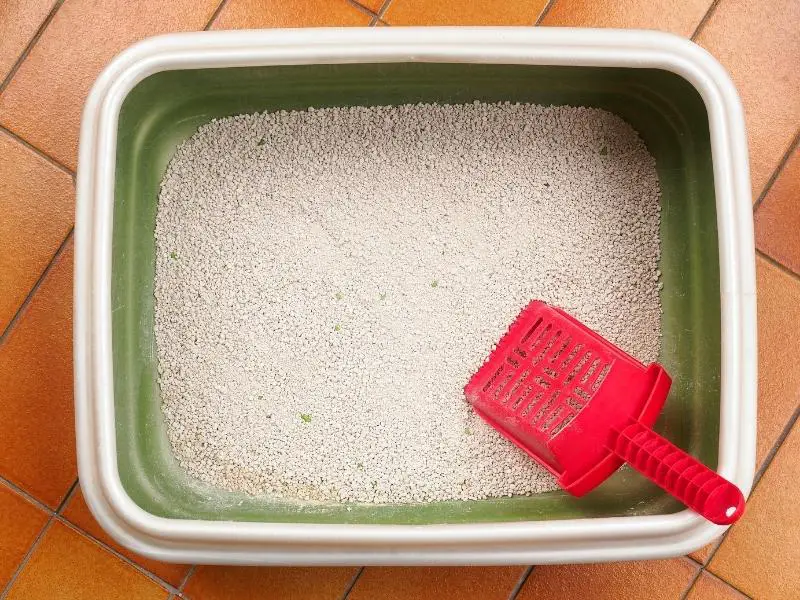If you are a cat-lover and have decided to adopt a pet bunny, you may think these pets can use the same litter box and save you money and time. Cats are very different from bunnies. Cats don’t eat their cat litter, but your bun most likely will.
So can you use cat litter for a rabbit, and is it safe?
Cat litter can be used for a rabbit, but it’s essential to ensure the litter doesn’t contain fragrances or crystals and doesn’t clump. Paper or wood-based cat litter (that is not fragranced) is always a better option, as rabbits are natural nibblers and may consume the litter, leading to serious health complications.
If you are busy litter training your floppy-eared friend and thinking of using cat litter, then this guide gives you all the information you need about the safety of using cat litter for your rabbit.
Can I Use Cat Litter for Rabbits?
Kitty litter can be used as litter or bedding for your bun. However, not all cat litter on the market is bunny-safe. These unsafe cat litters can cause an array of issues such as:
- Digestive issues
- Intestinal blockages
- Respiratory problems
Is Cat Litter Safe for Rabbits?

Cat litter is a safe option to use for your rabbits, but it’s essential to consider that rabbits chew and eat their litter or bedding (to explore and amuse themselves, and to help file down their ever-growing teeth).
Unfortunately, most cat litters on the market are harmful to rabbits.
Rabbits have sensitive respiratory and digestive systems, so you need to keep these things in mind when choosing a cat litter for your bunny.
Below are cat litter options that are NOT safe for your bunny:
Clay Litter
Clay litter is one of the most popular kitty litter on the market, as it’s a cheap litter or bedding option. You should avoid clay litter as it causes digestive issues in rabbits and can lead to blockages if your bun eats it.
Another reason clay litter is a no is that it’s very dusty and can cause respiratory issues for your bun.
The dust may settle in the litter box. But if your bun digs into the litter (which is natural as rabbits are diggers), the dust will linger in the air, resulting in your bun breathing in the dust.
Clumping Cat Litter
Regardless of the brand, any litter with clumping properties can be deadly for your bun and is one of the worst litter options you could use. Clumping litter absorbs and clumps around urine and moisture by expanding to almost 15 times bigger than its original size.
Imagine your bun eating a small amount of this litter, and then it starts expanding in its stomach? This can lead to severe blockages and total shutdown of your rabbit’s digestive system.
Crystal Cat Litter
Another cat litter you shouldn’t consider is crystal cat litter.
It may look fancy on the shelf with its blue or pink crystals, and yes, it may keep the odor at a minimum, but this litter is packed with chemicals that are toxic to your bunny if ingested.
Scented Cat Litter
Cat litter that is scented isn’t safe to use as a litter or bedding option for your floppy-eared friend. The chemicals used to scent the litter can be toxic for your bun and cause severe respiratory issues.
Your bunny has a sensitive nose and sense of smell, so sniffing that fragrance all day will cause irritation to your bun’s lungs, leading to further health issues.
Pros and Cons of Using Cat Litter for Rabbits
Let’s take a look at some of the pros and cons of using cat litter for rabbits:
Pros of Using Cat Litter for Bunnies
- A convenient option
- A cheaper option
- Cat litter comes packaged in large bags, which means it lasts longer
- Easier to clean up
- It has a wide variety to choose from
- It doesn’t have to be changed as regularly as shredded paper (for example)
Cons of Using Cat Litter for Bunnies
- Creates dust, which is harmful to rabbits
- Most cat litter causes digestive issues in rabbits, such as GI stasis if ingested
- Some cat litters contain chemicals that are toxic to rabbits to minimize odor and provide greater absorbency
- Scented litter can cause respiratory issues in rabbits
Other Alternatives You Can Use Apart From Cat Litter
Luckily, plenty of safe options are available to use as litter or bedding for your bun. Here is a closer look at some alternative options for your bunny:
Shredded Newspaper
Shredded newspaper is a fantastic option for your bun because:
- It’s absorbent
- It’s softer than cat litter
- It’s a cheaper option than most litters available
- It provides insulation for your bun
- It’s safe to ingest (as long as the ink isn’t toxic)
- It’s environmentally friendly
Hay
Hay is another excellent option for your rabbit because:
- It’s affordable especially if you purchase a bale
- It’s perfect for bedding as hay is soft
- Good-quality hay provides fiber for your bun
- Hay is biodegradable
- It absorbs urine and moisture
Paper-Based Pellets
Another great alternative is to use paper-based pellets as litter for your bun. A few reasons that make it a good option are:
- Paper is chemical-free
- It’s biodegradable
- Paper is absorbent
- It’s dust-free
- It controls odor
Shredded Cardboard
Shredded cardboard is an excellent rabbit litter option for your bun as it:
- Absorbs urine
- Provides insulation
- Provides your rabbits an opportunity to enjoy tearing up the cardboard
- Is relatively easy to clean up
What Is a Good Litter for Rabbits?
The best litter for your bun is any paper-based litter, as it’s safe for your bun to ingest (in small amounts), and it provides excellent insulation and absorbency.
There are many paper-based litters available such as:
- Compressed paper pellets
- Shredded newspaper
- Shredder paper
- Pulped paper
My Last Bunny Thoughts
Litter training your bun is a great idea, as it keeps their living space (and yours) clean and hygienic. However, make sure to choose a safe litter for your bun, as your bun’s health comes first.
Pick a cat litter that is bunny-safe, unscented, dust-free, and easy to clean up. Shredded paper or newspaper is a fantastic alternative as a litter option.
Remember, if you pick a litter that irritates your bunny’s sensitive nose, they will avoid using the litter box entirely, and the litter (and your hard work) will go to waste.
Related Articles:

